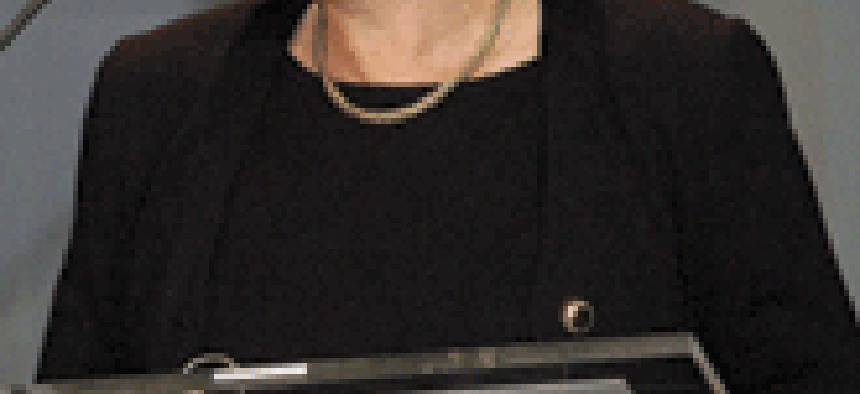Public Sector Partner of the Year (co-winner): Joann Kansier

The day Lockheed Martin Corp. officially took over a flight services network for the Federal Aviation Administration, Joann Kansier's husband sent her flowers with a note that read, "To the little train that could."
The day Lockheed Martin Corp. officially took over a flight services network for the Federal Aviation Administration, Joann Kansier's husband sent her flowers with a note that read, "To the little train that could."As head of the FAA's competitive sourcing office, Kansier oversaw the A-76 competition in which Lockheed Martin won a $1.9 billion contract to run the Automated Flight Services Stations network. It provides weather brief-ings, national airspace information and other services to pilots of noncommercial aircraft.Many in government and industry told Kansier the project would never succeed, she said. They said the A-76 competition, which let contractors compete for jobs held by the FAA's 2,500 flight service specialists, was fraught with political land mines. As the project proceeded, it was assailed by lawsuits and challenges from federal employee unions, questions from Congress and suspicion from contractors."When I came into work each morning, it was like coming into a firefight," she said.But Kansier persevered, and Lockheed Martin, which in February won the contract, began operating the flight services network in early October. The government expects to save $2.2 billion over the life of the 10-year deal.For her efforts, Kansier shared the Public Sector Partner of the Year award of the 2005 Greater Washington Government Contractors Awards. The other winner is Greg Rothwell, chief procurement officer for the Homeland Security Department.Kansier has served in government for 32 years, the last three as director of the FAA's competitive sourcing office. She has high praise for her 17-member project team. Despite the roadblocks they encountered, she said, they stayed focused.The project is noteworthy for yet another reason: the contract is performance-based. When FAA invited contractors and government employees to bid, it described the results it wanted and the metrics it would use to measure performance, but it let bidders propose the solutions. Lockheed Martin's contract contains financial incentives both for performance goals and for cost-savings, Kansier said.Although she is an enthusiastic supporter of A-76 competitions, Kansier said she recognizes the turmoil these competitions cause government employees. She received angry e-mails at work and voice messages on her home phone from FAA employees who did not want their jobs outsourced to the private sector. She worked with contractors and the FAA's human resources department to create an attractive benefits package for FAA employees who transitioned to Lockheed Martin."I did everything I could for our employees," she said.Kansier's office has now turned its attention to overseeing the contract. She describes it as a win-win for government and the pilots who rely on the automated flight service stations. The government saves money, the pilots get better service, she said."The naysayers thought the political hurdles would be too high for us to succeed, but I always believed we could," she said.


"The naysayers thought the political hurdles would be too high for us to succeed, but I always believed we could."
Joann Kansier, FAA
Zaid Hamid

